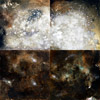 Although not overly prolific in his output, Andrew Moon has added another installment to Utech Records' URSK series which fits in to the ethos that the project has established: a disc of dark, ominous drone with a slight edge of noise. Considering there have been contributions from such scene titans as Skullflower and Final, RST holds their own, and is idiosyncratic enough to stand out among the throngs of guitar drone projects.
Although not overly prolific in his output, Andrew Moon has added another installment to Utech Records' URSK series which fits in to the ethos that the project has established: a disc of dark, ominous drone with a slight edge of noise. Considering there have been contributions from such scene titans as Skullflower and Final, RST holds their own, and is idiosyncratic enough to stand out among the throngs of guitar drone projects.
The opening of "Radiant" is all buzzing amplifier sustain, deep guitar tones, and a healthy mix of noise that—even though it is heavily in drone territory—feels more ambient than metallic. The longer "Constellation Drive," on the other hand, is steeped more in darkness and mystery, the harsher elements being more of a punctuation rather than a focus, with hints of chiming guitar that is consistent with modern day drone metal, but also has the influence of 1990s dark ambient and isolationist works that were the "next big thing" that never happened.
The other near-ten minute track, "When Fire Itself Came To Be Understood As A Process," feels similar with its bleakness built on digital distortion, menacing scrapes and cuts, and dive-bomb like guitar tones. It is lengthy, yet dynamic enough so it never becomes stale. The black metal influenced "Eternal City Ruins" and "Burnt Armour" are two of the more aggressive pieces, the latter EQ'd in such a way to max out the low and high frequencies, leaving little in the middle, and a lot of pain in the ears.
One of the high points of this disc for me is, though it definitely sounds murky and obscure, it's not a cliched "dark" album, but one that allows ambient and lighter sounds to shine through. The ending trilogy of tracks acts as the proverbial light at the end of the tunnel: the short "Planetfall" of simple guitar feedback has a warmth to it that the remaining tracks don't have, and to some extent feels like it could be a grimy piece of My Bloody Valentine style Jazzmaster abuse.
"Tin Sun II" is even brighter, the guitar noise channeled into angelic organ tones, with an overall warm and inviting feeling. The closing "Blue Smoke Sword" brings back some of the metallic elements, but in a softer mix, where it feels more misty than dark…its still somewhat ominous, but not in an evil way. No one will mistake it for Tangerine Dream, but it is a nice counterpoint to an otherwise monochromatic feeling.
Personally, I am very pleased at the fact that this disc is actually split up into individual tracks, rather than the traditional drone approach of 20+ minute pieces. In this context, it allows for much more diversity and variation from piece to piece, and that is one of the strengths of Tomorrow's Void: it manages to be simultaneously dark, but with lighter moments, with a nice balance of menace and inviting tones.
samples:
Read More

